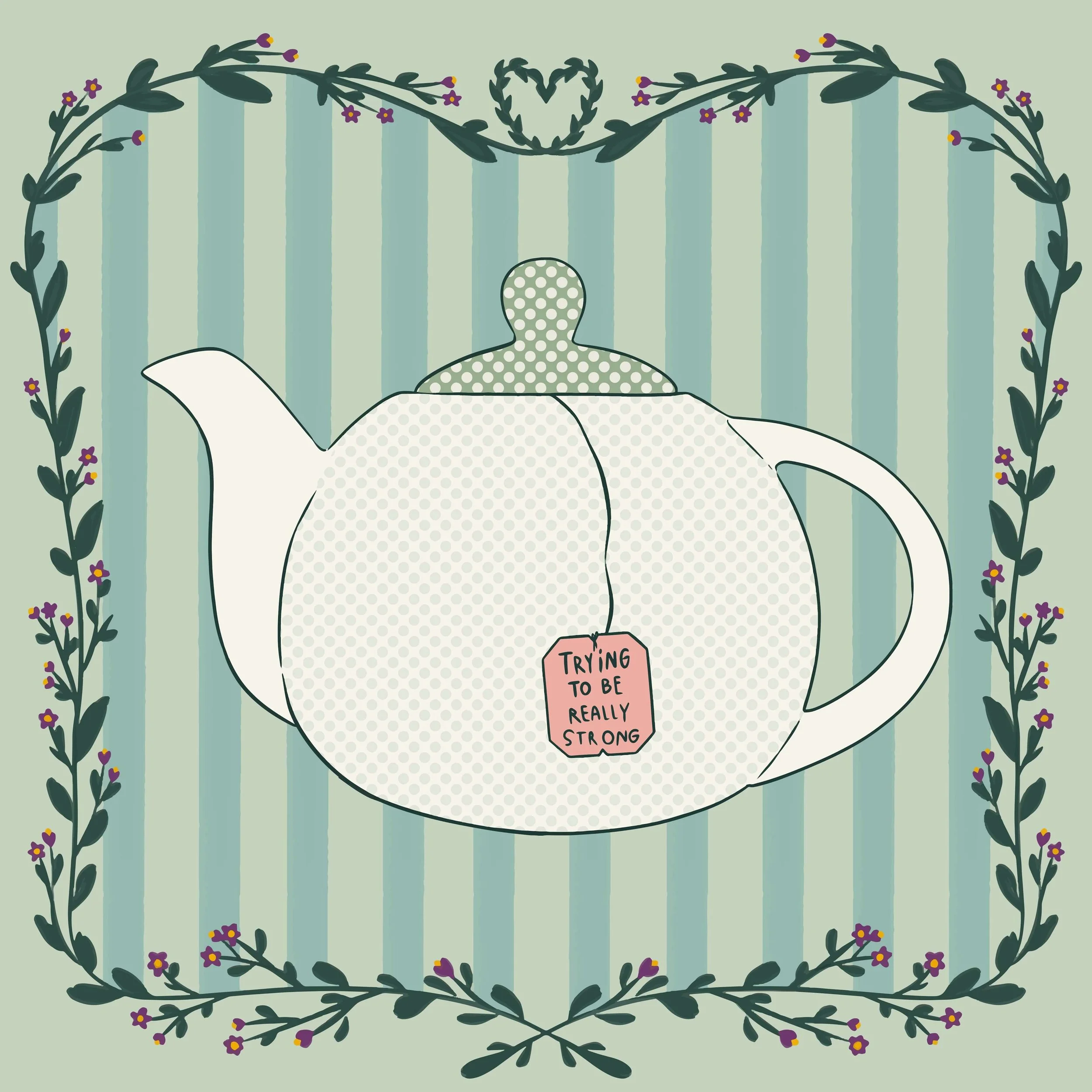7 Proven Ways that Guava Leaf is the Ultimate Perimenopause Superfood
Okay, okay, I’ll spill the tea…
Flipping through a questionably grimy copy of Redbook in the lobby of my doctor's office, I hoped this new doctor would be more up to date than this magazine. Damn, does Redbook even do print copies anymore? At 45, my body has betrayed me in every way, and so here I am, wasting an hour to hear "it's just your age" and be offered an SSRI and maybe some birth control. Sound familiar? After stumbling through early perimenopause like it was a bottomless mimosa brunch, I discovered something that actually had promise—and it wasn't another expensive supplement, or monthly subscription.
Enter guava leaves. Skip to the following paragraph if you're my boyfriend and want a quick summary, but for the rest of my ADHD storytellers, here we go. You know that Facebook group that pops up after a good scroll, "The View From My Window" or something? I glanced up from my desk, caught the end of a beautiful VI sunset, and snapped a picture to submit. The sunset is gorgeous every night, but I'm usually glued to my MacBook, trying to make sense of perimenopause, and I miss it.
This picture reminded me of the sheer volume of fruit trees in the yard, so I went outside, armed with my Google Lens, to nerd out. And then, I stumbled upon it—the recently pruned guava tree. When I googled the health benefits, I sank to the ground in disbelief. Has the answer to every perimenopause question literally been IN MY FRONT YARD?
#1: Regulates Irregular Periods
My perimenopause period stories would have horrified my 14-year-old self entirely. Trying to insert a tampon after a “bonus period”, in a white bikini, in the bathroom of a boat on a rough ocean day; Heading out solo on the town, after a tumultuous, public divorce in my new, sexy white jeans; Laying on the floor in an AirBnB bathroom in Tulum for days… etc, etc, etc.
When estrogen levels fluctuate, it can confuse even the most timely Aunt Flo. The flavonoids in guava leaves, particularly quercetin, act as phytoestrogens that can help balance estrogen levels in the body.
Quercetin also inhibits muscle contractions and relaxes the uterus, reducing the severity of cramps. While not a sedative, guava leaves’ mild antispasmodic and anti-anxiety properties can calm nervous tension and help you sleep better during your period.
This seemingly magical potion isn't a new discovery. Worldwide, women have used guava leaves amongst other holistic medicine practices for centuries to regulate their menstrual cycles. In Ayurveda and Traditional Chinese Medicine, guava leaves are considered “cool and stabilizing,” which is beneficial during perimenopause.
Peri Tip:
Regular consumption of guava leaf tea is key to stabilizing menstrual cycles—allow at least 8 weeks for results to be noticeable.
#2: Reduces Hot Flashes
Hot flashing in the Caribbean is Not. For. The. Weak.
In fact, the only guaranteed respite besides the ocean is the walk-in refrigerator in our grocery store. The employees who restock that area wear ski jackets, gloves, and hats. Other shoppers race in and out, shivering and runny—nosed. Finally, here I come, “perimenopause patty,” in my tank top and shorts, slowly smelling the fruits and checking the vegetables for firmness, savoring the arctic blast.
Guava leaves contain tannins and other phenolic compounds with serious anti-inflammatory properties. These help your blood vessels regulate temperature more effectively, which will help smooth out those wild temperature swings, even in 90-degree Virgin Island weather.
Research shows that the cooling properties of guava leaves aren't just old wives' tales; there is actual science behind them. The compounds in guava leaves help modulate your body's inflammatory response, which usually triggers hot flashes in the first place.
Peri Tip:
Keep a bottle of cold guava leaf tea in the refrigerator for quick access.
Freeze an ice cube tray with guava leaf tea to suck on when hot flashing.
#3: Boosts Libido
Close your eyes, turn on some Jodeci, and remember when sex was fun and not something you had to schedule between hot flashes and existential crises? Yeah, perimenopause knows how to kill a vibe.
Declining libido during perimenopause isn't just about hormones (though they are the main culprits). It's also about circulation, stress, energy levels, and feeling like a human instead of a walking collection of symptoms. Guava leaves can help reduce stress and anxiety, improve energy levels, and promote better sleep. When you're not exhausted, sweaty, and stressed, you actually start feeling like yourself again.
The antioxidants in guava leaves support overall reproductive health. Some compounds found in the leaves increase natural vaginal moisture and reduce discomfort during sex. In traditional medicine, guava leaves haven't been used as an aphrodisiac; however, the leaves improve circulation, and better blood flow means better sex, if you catch my drift;)
Peri Tip:
Sipping on warm guava leaf tea is my favorite part of my bedroom routine.
#4: Promotes Hair Growth
As a kid, I frequently wondered aloud why all “moms” had short hair. My mom told me it was considered a faux pas to have long hair over 40. Since I didn't know about perimenopause, how could I have predicted that it came with hair loss? One day, I'm washing my hair like usual, and the next day, I'm shedding like my coconut retriever in June. What the actual hell?
Shedding, thinning hair, breakage… Your body says, "You know what would complete this hormonal chaos? Bald spots!” The antioxidants in guava leaves improve blood circulation to your scalp, and the anti-inflammatory compounds calm your follicles and allow regular hair growth cycles to resume.
Almost as vital, the tannins in guava leaves have astringent properties that tighten and tone your scalp, reducing breakage and making hair thicker and stronger. They also possess antibacterial and antifungal properties that combat dandruff, regulate sebum production, and alleviate itchiness.
Peri Tip:
Use cool guava leaf tea as a hair rinse after shampooing. Leave it in for five minutes every time you wash your hair.
Make a hair mask - blend ground fresh guava leaves with coconut oil (or another oil, as coconut oil will dry out certain hair types)
#5: Stabilizes Blood Sugar
Blood sugar. Those two words had never come out of my mouth (linked together) before perimenopause. I vaguely knew that blood sugar had to do with diabetes, and only because a camp friend always had to have an orange with her.
Enter Perimenopause (to the tune of 🎵Enter Sandman) and blood sugar instability. During perimenopause, insulin resistance can increase, making it harder to process glucose effectively. This leads to weight gain, especially around the midsection, seemingly overnight, like the Tooth Fairy.
Guava leaves are praised for their blood sugar benefits. Research shows that compounds in these leaves can slow down carb absorption and boost insulin sensitivity. In other words, they give your body better control over sugar traffic, keeping those glucose spikes in check naturally.
Peri Tip:
Try drinking guava leaf tea 30 minutes before meals, especially on spaghetti night:)
#6: Improves Sleep Quality
My sleep during the first year of perimenopause? Absolutely wild - and not in a good way. I thought maybe it was like new parent exhaustion, but every mom friend assured me this was its own special brand of hell. Between the night sweats, racing thoughts, and that 3 AM panic spiral about whether you're losing your mind, decent sleep becomes about as rare as affordable healthcare.
Guava leaves boost your brain's production of GABA, a neurotransmitter that acts like your body's built-in Xanax. GABA is what tells your overactive mind to quiet down and slip into deep, restorative sleep.
The relaxation benefits aren't just anecdotal. Traditional medicine has utilized guava leaves as a natural sedative for centuries, and modern research is now supporting what our ancestors already knew.
Peri Tip:
I unplug an hour before bed, brew a cup of tea, and practice mindfulness. No phone, no music, no laptop; just my journal, my tea, and me:)
#7: Fights Brain Fog
Brain fog is the absolute worst symptom of perimenopause, and I will die on this hill.
One day, you're sharp as a tack, and the next day, you're standing in your kitchen wondering why you opened the refrigerator while holding a handful of clean socks. (Yes, that was me.)
The antioxidants in guava leaves are neuroprotective, meaning they help improve circulation to the brain and protect against oxidative stress. Think of your brain during perimenopause like an older iPhone running too many apps. Guava leaves help close some of those apps and give your brain the refresh it desperately needs.
The stress-reducing properties also play a huge role in mental clarity. When you're constantly stressed, your cognitive function suffers. Guava leaves help lower cortisol levels (a stress hormone), allowing your brain to function more clearly. My favorite part? Guava leaf tea does not contain caffeine, so it offers steady and sustained mental clarity, not a quick boost and a crash like coffee.
I noticed the difference about three weeks into drinking guava leaf tea daily. Words came more easily, I could finish sentences without forgetting what I was talking about halfway through, and I could remember where I parked my car at the supermarket.
Peri Tip:
Be consistent in your tea drinking for the best mental results.
How to Find, Prepare, & Use Guava Leaves
Fresh vs. Dried Leaves - Fresh is ideal, but not everyone has a guava tree in their front yard:) Some Asian or Caribbean grocery stores may carry fresh guava leaves, but remember that dried leaves work just as well and are much more convenient. This pack of 500 organic leaves is organic and currently on sale.
Organic is best, especially when you are using food to heal or balance your body.
Guava leaves are readily available, affordable, and natural, without a scary list of side effects.
Always consult your doctor, especially if you are taking medications or have a co-existing health condition. Certain diabetes medications and hormone replacement therapy (HRT) may interact with guava leaves.
If using fresh leaves (from a tree, grocer, or nursery), look for bright green leaves with no visible white powder or damage from insects. Wash the leaves thoroughly and dry them thoroughly. You can dry them outside, but not in direct sunlight, as that may lessen the effectiveness.
Using a handful of leaves, fresh or dried, add them to a pot filled with water and bring to a boil. Allow the leaves to simmer for about 15 minutes, and then strain.
Let the tea cool before using it as a hair rinse.
To make a hair mask from guava leaves, grind them with a mortar and pestle and then hand-whip with coconut, almond, or another oil.
Hit Me With Your Best Pot
Guava leaves won’t cure perimenopause (because nothing can). We can either stumble through it like a drunk baby or arm ourselves with information to help us smooth the ride. Remember, this isn’t medical advice, it’s just one woman sharing what has worked for her.
Have you tried guava leaf tea? Do you have any other natural remedies? It’s your turn to serve the tea! Tell me everything in the comments:)







